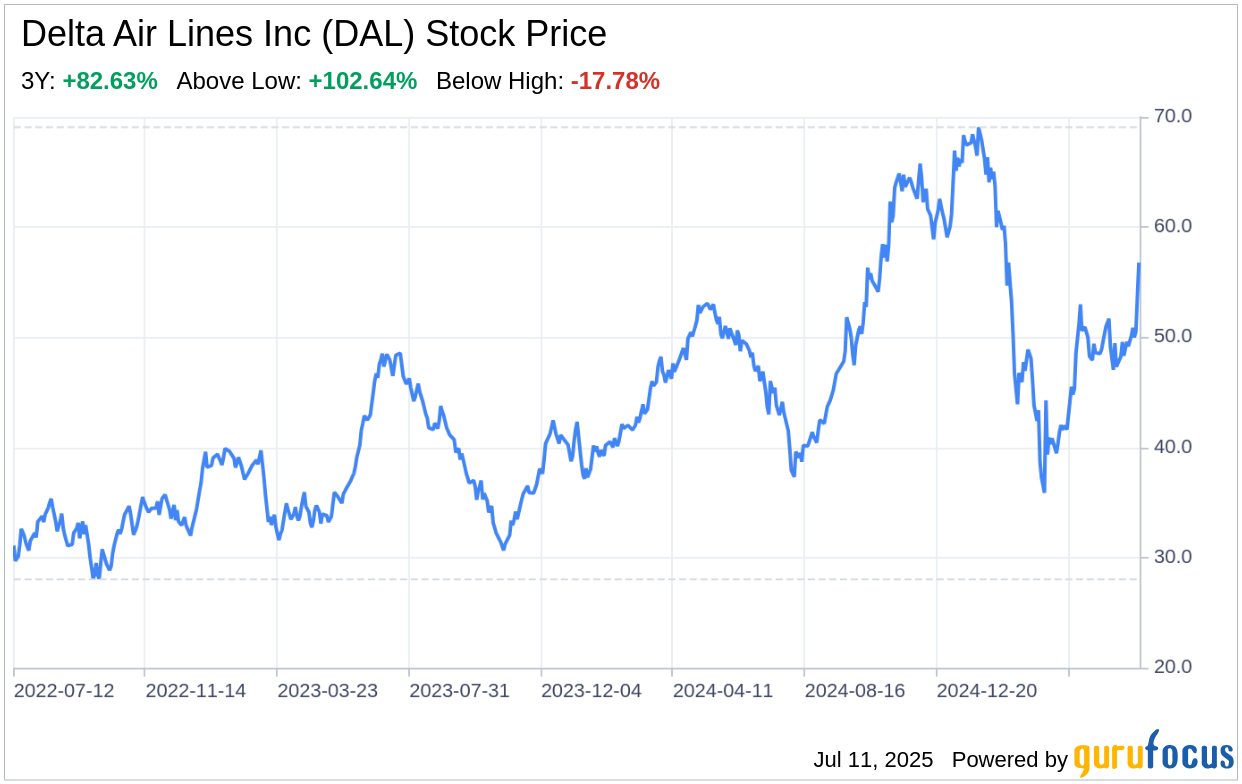On July 10, 2025, Delta Air Lines Inc (DAL, Financial), headquartered in Atlanta, filed its 10-Q report, providing a detailed look into its financial performance and position. As one of the world's largest airlines, Delta operates a vast network, connecting over 300 destinations across more than 50 countries. The company's hub-and-spoke system, centered around major hubs like Atlanta and New York, has been a cornerstone of its operational strategy. The recent filing reveals a company with a strong balance sheet, boasting total assets of $78,395 million, an increase from $75,372 million at the end of the previous year. Delta's net income for the six months ended June 30, 2025, stands at $2,370 million, reflecting a robust financial performance despite the challenges faced by the airline industry.

Strengths
Brand Power and Network Dominance: Delta's brand is synonymous with reliability and customer service, which has cultivated a loyal customer base. The airline's extensive network, with major hubs in strategic locations, ensures a dominant market presence. This network enables Delta to efficiently gather and distribute passengers globally, which is evident from its strong passenger revenue of $13,867 million for the three months ended June 30, 2025. The company's ability to maintain a high level of service and operational efficiency has been a key factor in its success.
Financial Resilience: Delta's financial health is a testament to its resilience. With a significant increase in total assets and a solid cash and cash equivalents position of $3,331 million, Delta showcases a strong balance sheet. The company's retained earnings have also seen a notable increase to $10,833 million, up from $8,783 million at the end of the previous year, indicating a robust accumulation of profits and a strong financial buffer to weather industry volatility.
Innovative Partnerships: Delta's strategic partnerships, particularly its co-brand credit card relationship with American Express, have bolstered its financial position. These partnerships have led to significant cash sales, with $3.9 billion in the six months ended June 30, 2025, a 9% increase from the previous year. These innovative collaborations have diversified Delta's revenue streams and enhanced its financial stability.
Weaknesses
Debt and Lease Obligations: Despite a strong balance sheet, Delta carries substantial debt and lease obligations, with current maturities of debt and finance leases at $2,220 million and noncurrent liabilities totaling $32,401 million. This level of indebtedness requires careful management to ensure long-term sustainability and may limit the company's financial flexibility in pursuing new opportunities or weathering economic downturns.
Dependence on Fuel Prices: Volatility in fuel prices remains a significant challenge for Delta, as fuel costs represent a considerable portion of operating expenses. The six months ended June 30, 2025, saw a decrease in aircraft fuel and related taxes by $541 million due to a 15% decrease in the market price per gallon of jet fuel. However, this volatility can have adverse effects on profitability and requires ongoing risk management strategies to mitigate potential impacts.
Workforce Management: The increase in salaries and related costs, resulting from base pay increases for eligible employees, reflects Delta's commitment to its workforce. However, this also adds to the company's cost structure, which could impact its competitive pricing ability, especially in the face of aggressive competition from low-cost carriers.
Opportunities
International Expansion: Delta's strong international presence, particularly over the Atlantic, presents opportunities for further expansion. With international passenger revenue increasing by 4% for the six months ended June 30, 2025, Delta can leverage its brand and operational expertise to capture additional market share in emerging markets and strengthen its global network.
Fleet Modernization: Delta's commitment to investing in new aircraft and technology enhancements, with an expected 2025 capital spend of approximately $5.0 billion, positions the airline to improve fuel efficiency and passenger experience. This modernization effort can lead to operational cost savings and attract a new generation of travelers seeking sustainable and technologically advanced travel options.
Digital Transformation: The airline industry is increasingly moving towards digitalization, and Delta has the opportunity to lead this transformation. By investing in digital platforms and customer experience enhancements, Delta can streamline operations, improve customer engagement, and unlock new revenue streams through personalized offerings and services.
Threats
Economic Sensitivity: The airline industry is highly sensitive to economic cycles. Any downturn can lead to reduced demand for air travel, impacting Delta's profitability. The company must remain vigilant and adaptable to changing economic conditions to maintain its market position.
Regulatory Changes: Airlines operate in a heavily regulated environment. Changes in aviation policies, environmental regulations, or increased taxes can have significant operational and financial implications for Delta. Staying ahead of regulatory changes and engaging in proactive advocacy is crucial for the airline's continued success.
Competitive Pressure: The airline industry is characterized by intense competition. The rise of low-cost carriers and the expansion of existing airlines can erode Delta's market share and put pressure on fares. Delta must continue to innovate and differentiate its offerings to retain its competitive edge.
In conclusion, Delta Air Lines Inc (DAL, Financial) exhibits a strong market position with a robust network, a loyal customer base, and a solid financial foundation. However, the company must navigate the challenges of high debt levels,
This article, generated by GuruFocus, is designed to provide general insights and is not tailored financial advice. Our commentary is rooted in historical data and analyst projections, utilizing an impartial methodology, and is not intended to serve as specific investment guidance. It does not formulate a recommendation to purchase or divest any stock and does not consider individual investment objectives or financial circumstances. Our objective is to deliver long-term, fundamental data-driven analysis. Be aware that our analysis might not incorporate the most recent, price-sensitive company announcements or qualitative information. GuruFocus holds no position in the stocks mentioned herein.
